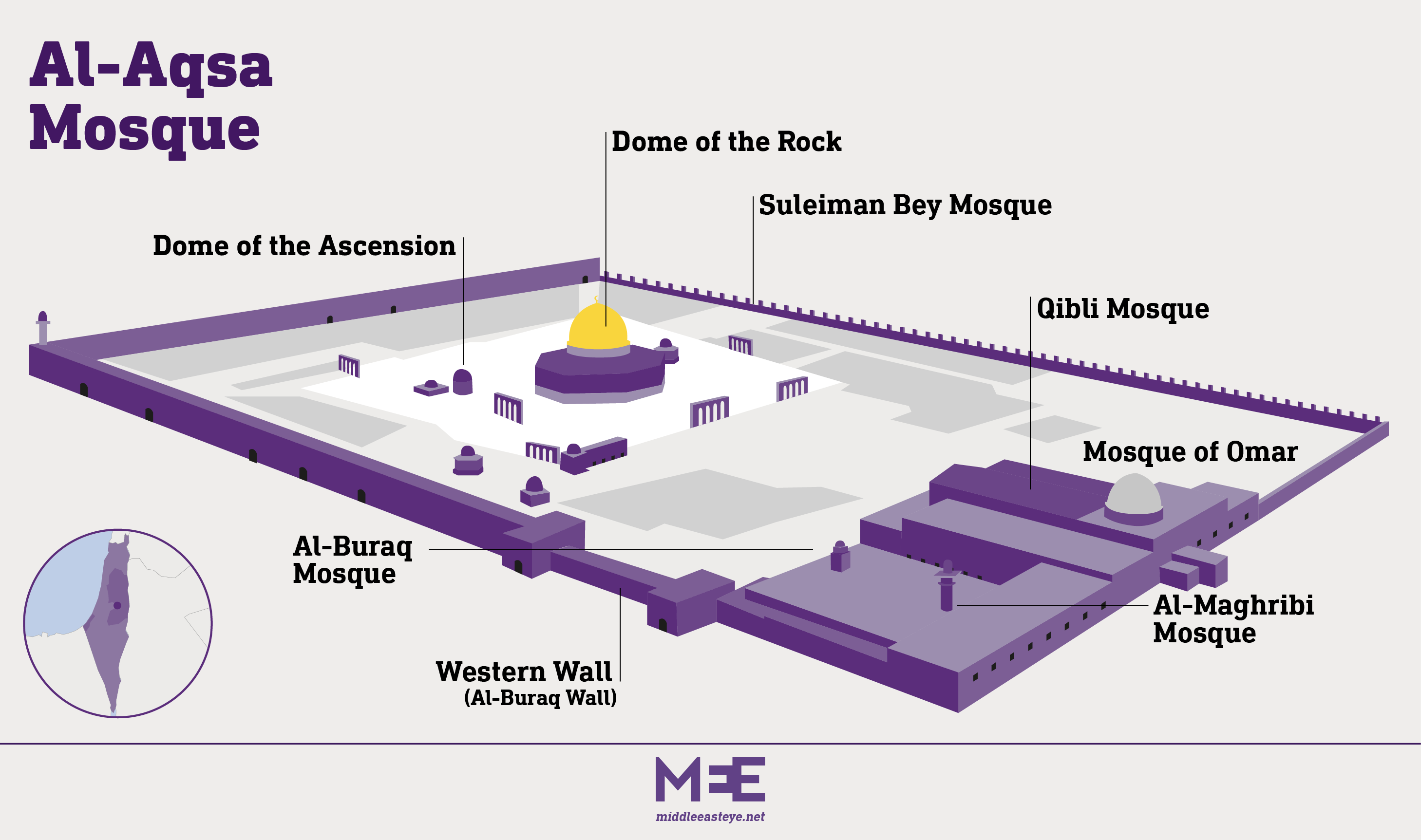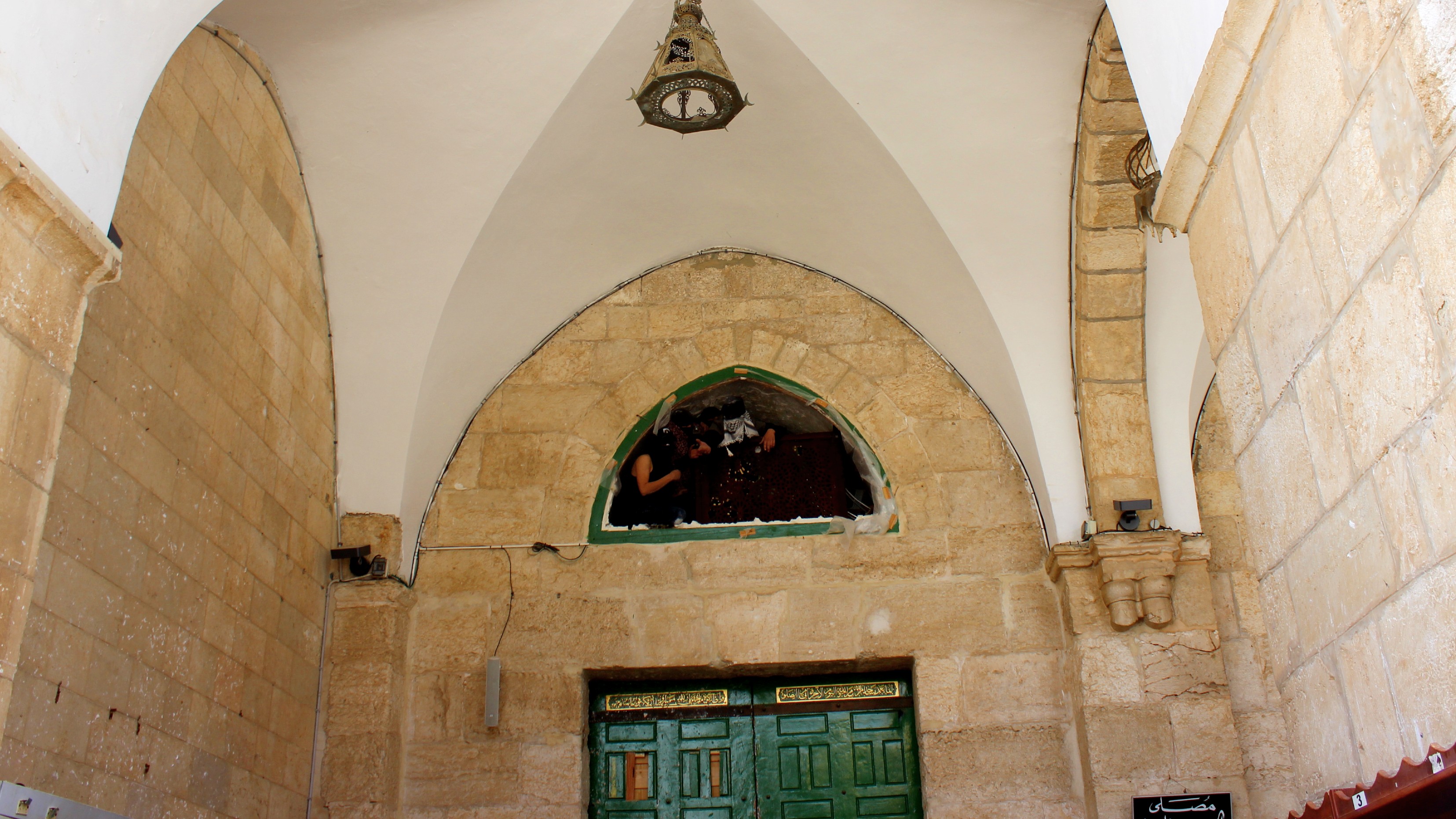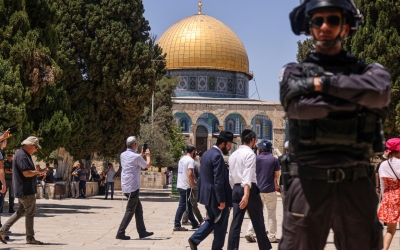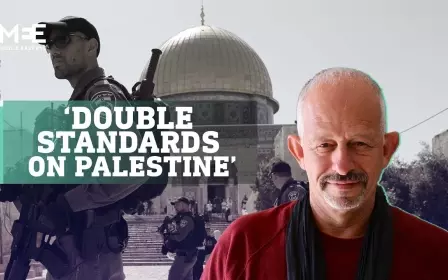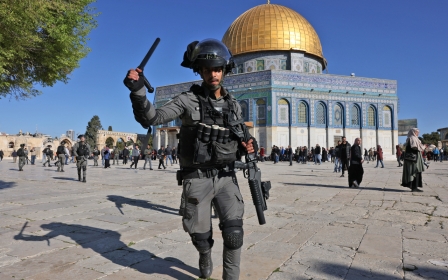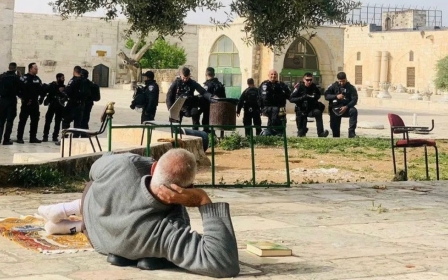A tumultuous week at al-Aqsa Mosque ends with renewed Palestinian defiance
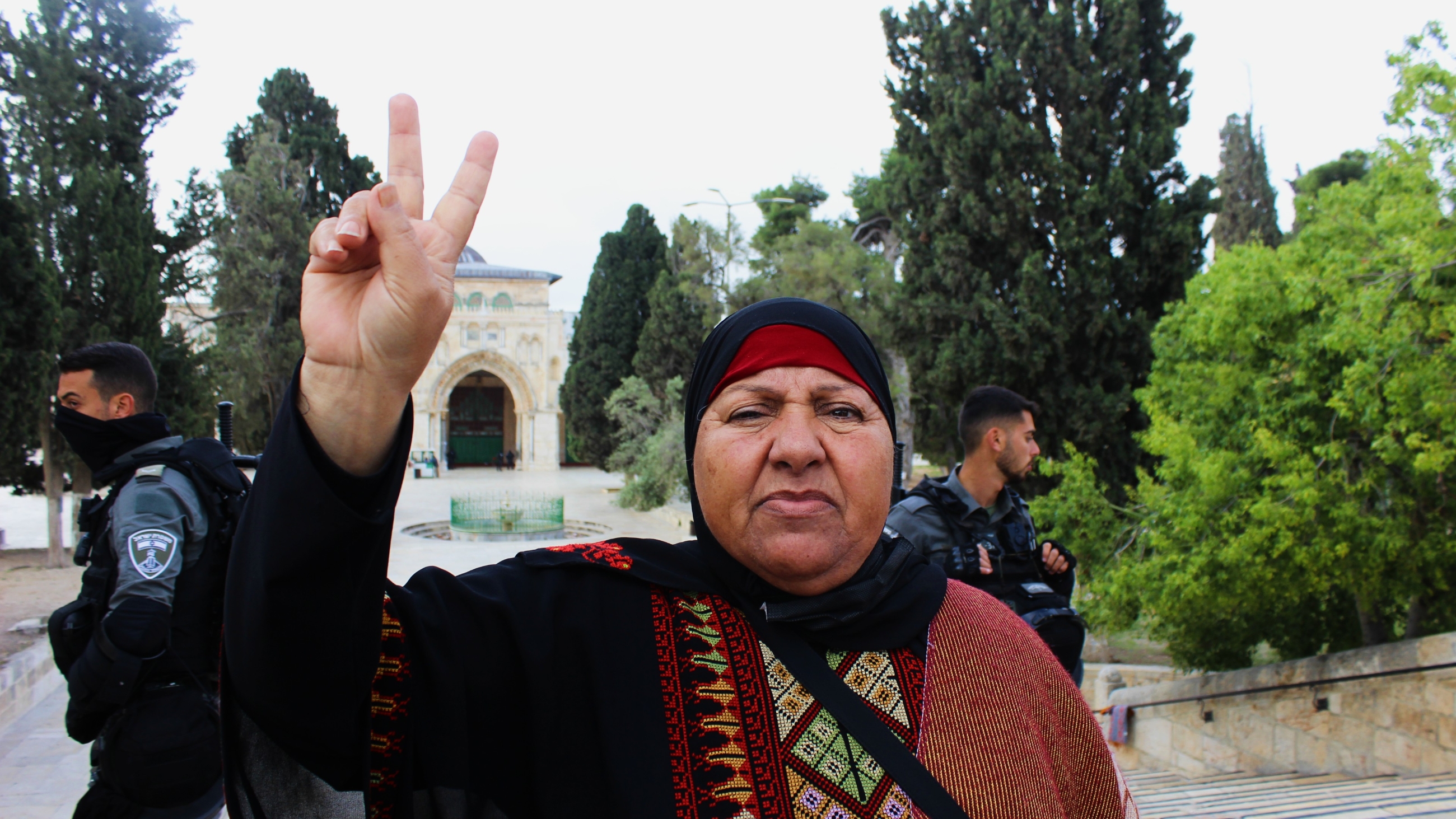
Thursday wrapped up one of the most intense weeks that al-Aqsa Mosque has seen in recent memory.
It has seen violent raids by Israeli forces, thousands of far-right intrusions, and repeated assaults on worshippers young and old.
These were just some of the hardships Palestinians had to endure in the mosque as they mark the holy month of Ramadan in the revered occupied East Jerusalem site.
Every day since Friday last week, except Saturday, began the same way.
On the eve of dawn prayers, thousands of worshippers flock to the mosque from across Jerusalem and Palestinian towns inside Israel.
New MEE newsletter: Jerusalem Dispatch
Sign up to get the latest insights and analysis on Israel-Palestine, alongside Turkey Unpacked and other MEE newsletters
The first hurdle for many starts here.
Israeli forces guarding the gate of al-Aqsa stopped many before reaching the mosque and sent them away - especially young men - restricting the flow of worshippers.
Others were allowed in under the condition they hand over their IDs, a measure of control on worshippers, Palestinians say, to keep tabs on who's inside the mosque at all times.
In the courtyard of the mosque, an unusual silence hangs over the 14-hectare complex ahead of dawn prayer, a time in which al-Aqsa is usually teeming with worshippers.
Outside the golden-roofed Dome of the Rock stands one of the mosque's guards, feeding the birds.
A few dozen worshippers mill about to snap selfies as mementoes of their visit, some of them West Bankers visiting Al-Aqsa Mosque for the first time.
In front of the al-Qibli prayer hall at the southern end of al-Aqsa, older worshippers congregate in small groups and recite passages from the Quran.
This tranquil scene is then abruptly interrupted by dozens of Israeli special forces, who begin to descend into the mosque armed with weapons at around 6 am, local time.
They storm the complex from the southwestern end through the Moroccan Gate (Bab Al-Magharba) and begin to disperse the peaceful worshippers.
For the next five hours, Palestinians are attacked and restricted in their mosque, while hundreds of far-right Israelis roam around protected by police.
Confining worshippers
For the duration of the raids, the prayers and shouts of worshippers do not cease. Neither do the barrels of the officers' rifles, firing off rubber-coated steel bullets at the protesters inside the Qibli Mosque through now-perforated windows.
Added to the bullets are the clouds of teargas that fill the mosque, while sound grenades stun worshippers.
Palestinians are cleared out of the mosque's courtyards with some forced out of the complex altogether, and others confined in the two main prayer halls - the Qibli mosque and the Dome of the Rock.
Women in the Dome of the Rock, manhandled and shoved around by police, remain steadfast to do all they can to make their voices heard.
They recite the Quran in groups, shouting religious and national slogans at the procession of settlers walking by, and confront the officers all morning.
"The attempt to divide Al-Aqsa in time and space [between Muslims and Jews] are ongoing, but all of the occupation's plans shall not pass so long as there are those who recite the slogan, 'with our souls, with our blood, we will sacrifice for Al-Aqsa,'" said Muntaha Amara, one of the few women who managed to stay near the Dome of the Rock during the raid on Wednesday.
Despite repeated arrests and bans against her entering Al-Aqsa, Amara - niece of Palestinian leader Raed Salah - says she is not deterred by Israeli assaults, regarding her continued presence in al-Aqsa as a national duty.
"We have all the right in the world to praise God, recite the Quran and pray in any place of our choosing. We are at al-Aqsa," Amara said.
'Audible disruption'
Dozens of metres away, loud noises can be heard coming from inside al-Qibli mosque where young men are trapped.
As a way of protesting the raids and holding on to their rights in the mosque, men inside bang on the door for hours and raise their voices in chants at the officers manning the 11 locked gates of al-Qibli.
They also use loudspeakers to play alarm sounds, national songs, and broadcast recorded speeches by Palestinian military and national leaders, all in a bid to disrupt the settlers as they march across from them in large groups.
"When the settlers hear the chants and loud bangs they cower in fear and retreat, which shows that they are not here justly, and those who are the rightful owners fear nothing," Amara said.
And amidst these acts of what Palestinians call "audible disruption", Hussein Hasasneh, an elderly worshipper, was sitting looking worried underneath a tree across from al-Qibli Mosque.
'We are strong, and we do not want anyone's help. We will continue to defend this sacred ground with our bodies laid bare.'
- Fatima Khader, Jerusalem resident
The recent raids had turned the mosque into a "battleground" he said, and are the most dangerous in recent memory.
By allocating specific time slots and areas of worship to Jews while Muslims are cleared out, Hasasneh fears the division of the mosque is underway.
Not far away sat Fatima Khader, another elderly Jerusalemite, with tears in her eyes.
"We are tired of constantly saying 'Al-Aqsa is in danger,' and of always calling on the Arab and Islamic world to intervene on our behalf," Khader told MEE.
"We are strong, and we do not want anyone's help. We will continue to defend this sacred ground with our bodies laid bare."
Ongoing struggle
The settler intrusions into al-Aqsa this week, in which Jews marked the Passover holiday, ended on Thursday.
They will be stopped until the end of Ramadan in early May, before being resumed again albeit in smaller numbers and when there are fewer Palestinians around.
In the six violent raids carried out by Israeli forces since Friday, more than 180 Palestinians were wounded by rubber-coated steel bullets, baton strikes and gas inhalation, according to the Palestinian Red Crescent Society (PRCS).
More than 450 people were arrested and dozens more were stopped from entering the mosque.
In the same period, around 3,670 Israelis entered al-Aqsa with the protection of police over five days, according to a tally by the Waqf, an Islamic trust that manages the affairs of the mosque.
Abdallah Marouf, a researcher and former public relations official of Al-Aqsa Mosque, warned that the events of this week will have dangerous ramifications.
"What has happened indicates that the occupation desires to bring about a new status quo at the al-Aqsa Mosque, which would seek to normalise the [settler] raids and make their non-occurrence the exception," Marouf told MEE.
This would be a flagrant violation of the sanctity of al-Aqsa Mosque, Marouf added, with the objective of fulfilling the dream of ultranationalist Israelis in asserting Jewish dominance at the expense of the Muslim presence in the mosque.
The goal, he added, is to turn al-Aqsa into a "shared holy site," and be both a temple and a mosque.
"This is where the danger of these raids lies."
'The occupation does not want to retreat one step in its ambition to attain a new foothold at al-Aqsa'
- Abdallah Marouf, Palestinian researcher
As part of an understanding between Jordan – the custodian of Islamic and Christian sites in Jerusalem – and Israel, non-Muslim tourists are allowed to visit al-Aqsa under the supervision of the Waqf but only Muslims are allowed to pray in it.
But in recent years, Israeli authorities have ignored this arrangement and allowed far-right groups to enter the mosque and perform silent prayers.
Such groups advocate for the destruction of al-Aqsa Mosque, where they believe two ancient Jewish temples once stood, to make way for a third temple.
The level of aggression shown by Israeli authorities this week to allow settlers' tours indicates that the struggle over who has the right to al-Aqsa will only get worse from now on, Marouf said, despite the raids ending for now.
"[The raids] indicate that the occupation does not want to retreat one step in its ambition to attain a new foothold at Al-Aqsa."
Middle East Eye delivers independent and unrivalled coverage and analysis of the Middle East, North Africa and beyond. To learn more about republishing this content and the associated fees, please fill out this form. More about MEE can be found here.


